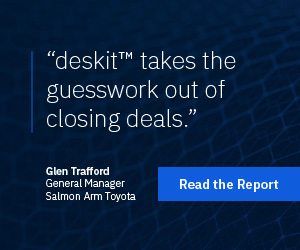Training means success for dealerships like the OpenRoad Auto Group

OpenRoad Group is one of the fastest growing dealer groups in Canada and was recognized as a one of the best places to work in the country two years in a row on Aon Hewitt’s list. “We were the only dealer group to make it into the Top 10 this year,” says HR director Sharon Rupal.
In automotive retailing, the fast pace of new technologies, concepts and strategies means there’s never a dull moment. It also requires dealers to be on their toes to stay ahead of the curve.
A big part of that is ensuring that staff working in all facets of the business are thoroughly prepared to meet the demands and challenges ahead, and that means placing strong emphasis on training programs.
In many regards, however, training remains one of the most misunderstood aspects of the business, with no hard and fast rules about how much training or what type of programs yield the best results.

Sometimes taking a real visual view can be everything. Mitch Gallant, director of e-Commerce at Capital Ford Lincoln in Regina, uses this “football” field for planting team ideas, each represented as a ball. “It provides a real focal point for discussing and developing new concepts, giving us a chance to develop and learn,” he says.
Right people in the right place
Sharon Rupal, director of Human Resources at Metro Vancouver–based OpenRoad Automotive Group, one of Canada’s most successful multi-franchise dealer groups, believes that central to successful training strategies is having the right people in place as well as developing an environment that gives them the opportunity to thrive.
Rupal says that fostering a corporate culture where bright, articulate people can really achieve their best is just as critical as finding the right staff for the job. “The old saying of treat others how you want to be treated is just so true,” she says.
“For us, communication is everything. We encourage feedback among our associates via regular meetings and often the best ideas are those that come from staff who are dealing directly with our customers. Sharing their experiences helps us better analyze where we’re at and where we want to go. As an organization, we are always looking to improve and diversify.”
Last summer, the company went through a process of revisiting its collective goals, which included an assessment of cultural values. They assembled focus groups, which for 2012 will continue to work on aspects of the business where management feels improvements remain to be made.
Train to win
A big part of that includes training practices and programs. OpenRoad Group is actively involved in about 10 training programs each year.
“There’s a real need for them,” says Rupal. “These training programs are important because it’s often easy to take for granted the skills that staff have. That’s why we’ve been developing focused training such as several Southern Alberta Institute of Technology (SAIT) courses in which associates are enrolled each year alongside our own lunch-and-learns.”
The latter are put together locally, and essentially focus on soft skills, such as learning IT programs like MS Word, Excel and Outlook. “As technology advances, it’s easy for us to assume that everybody we bring on board is familiar with a suite of different IT-based programs, though that isn’t always the case,” says Rupal. “Some associates might not be fully computer literate, but they may have a great background in customer sales and service. We see the lunch-and-learn concept as being able to provide an additional skill set that benefits both the associate and our business.”
Proper support
Mitch Gallant, director of e-commerce at Capital Ford Lincoln in Regina, Sask., also believes that having the right people is essential, but so is finding ways to ensure that they can achieve their best. That includes motivation and training, and developing a solid support system. Too often dealers find the right people, he says, only to let them wither on the vine because an adequate support system isn’t in place to help employees grow.
“You see it all too often in our business,” he says. “You have the bright young spark who comes along, full of ideas and energy. Yet after two or three months, this person stops putting their hand up and falls in line with the monotonous march to the lunch room and back and it’s often because they aren’t given direction. There’s no feedback from management to measure how they’re performing and there’s limited advice or incentive to improve their skill set or take advantage of the talents they have. If you’ve got a great idea, there needs to be a vehicle that can deliver it.”
One method Gallant has been able to do that with his group is by implementing a “Roughrider” football field for ideas. “Anyone can come in and add ideas,” he says, “though we’ll only have three ideas on the field at any one time [three sales, three marketing]. That way, not only do people feel like their idea is being heard, it’s also the focal point, and over time everybody is confident it will be executed.”
Gallant also finds that on a personal level, reading books and listening to audio and marketing podcasts, particularly while travelling, can provide a good form of self-directed training and improvement.
Gallant says he believes there are many options out there that dealers can discover by attending cutting edge training seminars and conferences, designed to grow their businesses and take advantage of the latest and greatest tools available.
Gallant himself actively attends many of them and has witnessed firsthand what a veritable treasure chest of useful ideas and concepts can be gained from them.“From my perspective, some of the conferences, particularly the Driving Sales Executive Summit, as well as the PCG Digital Marketing conferences, can prove to be real eyeopeners when it comes to new ideas. Being able to go back home and implement what you’ve learned into effective strategies, however, is where it really matters. You need to have a solid plan and you need to get everybody around you actively involved.”
Share learning
For Gallant, this includes holding group-based idea sessions and team building exercises, including extra-curricular activities, instead of just providing incentives or prizes for those who reach specific sales targets or are generating a certain amount of revenue. “It’s often easy to just say, ‘Let’s throw money at a problem and create a spiff program.’ However, often in the long term, such an approach can actually prove to be detrimental,” he says.
Sales people aren’t coin operated, he says, and for management to provide effective mentoring and motivation, the sales staff need to feel they’ve got ownership of their own success.
“Think of a coach and their sports team. A successful coach is able to motivate his players to perform at their best, through both practice and encouragement; the same applies in our business, or any business for that matter.”
Fixed solutions
For many dealers, fixed operations is often seen as one area beset with challenges when it comes to training, especially with the advanced technology in modern vehicles and the skills and equipment required to service and repair them.
At OpenRoad Group, one method of meeting this challenge has been bolstering factory training seminars and online learning, by partnering with higher education institutions to develop internal programs. “We’ve been implementing a leadership development program in conjunction with SAIT,” says Sharon Rupal. “It’s two years long and has really proved beneficial, allowing our associates to stay on top of the latest technology and techniques, as well as developing innovative approaches for tackling specific issues.”
Mitch Gallant has also seen how fostering great partnerships to develop training programs can provide the traction needed from raw ideas. “When you’ve got a great concept, having a solid partnership can really help bring it to fruition. I remember attending one of my very first training seminars by what was then ASL, now Sun Media. It really helped define some raw ideas that I had and by partnering with Kain Automotive, it has evolved into a really valuable online sales training program at Capital Ford.”
Yet beyond on-the-job training, graduate programs that prepare the next generation of young people for entering the car business can also provide a solid foundation, both for the students and the dealers that recruit them, a foundation on which future training programs can build upon. The Canadian Automotive Institute at Georgian College in Barrie, Ont. being a good example. (The CAI recently re-branded itself as the Automotive Business School of Canada.)
“For more than 25 years we’ve been helping students develop and prepare for a career in this fast-moving industry,” says CAI marketing specialist Jennifer Sheremeto. “Having support from both auto manufacturers and dealers has proved to be a major advantage, as many of our alumni have gone on to very successful careers in the industry.”
Georgian’s annual Auto Show, which is hosted each June and entirely run by final-year students in the CAI Automotive Marketing program, serves as a good example of how the results of learning can really bear fruit over the long term.
“It is a culmination of what they’ve learned during the course of the program,” says Hank Thibideau, who serves as manager for the event. “It gives the students real-world experience in the industry, because they’re dealing with both the manufacturers and also the public. When they actually embark upon their careers, along with theory-based learning and internships, they’ve already got a solid, practical training base.”
For Gallant, well-trained employees don’t happen by chance: they happen by design.
“You need to have a clear plan on what you want to do,” he says. “Put it down on paper and have a daily, weekly and even monthly review of your goals. Get it all down: the how, where, why and what. Interact and teach your staff to follow the same approach, for if you do, in terms of training, you’ll ultimately end up winning no matter where your starting point might be.”


















